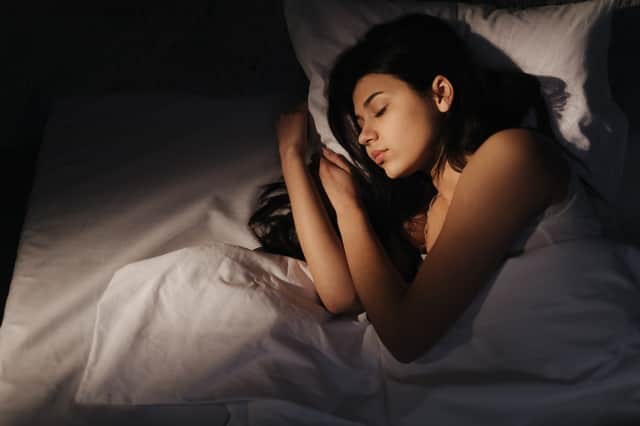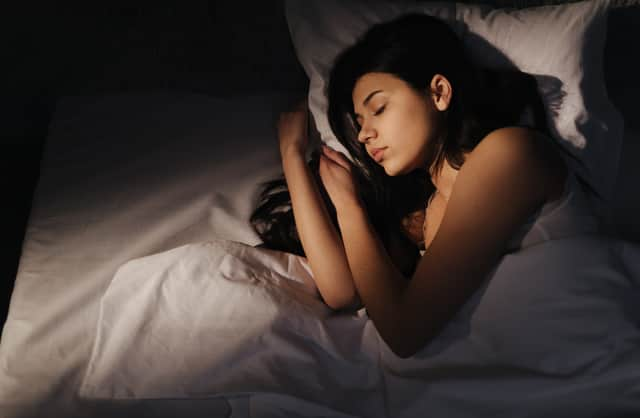TikTok sleep trends: NHS doctor debunks six trends - including bed rotting, mouth taping and moon breathing


People use social media platforms such as TikTok for a variety of reasons; for some it's a news source, for many it's a place to get involved with viral trends, and for others its a place to share hacks and tips meant to make our lives easier.
One of the things content creators on TikTok have advocated is an array of sleep health trends, aimed to transform sleep quality and uplift overall wellness among users, but it could be bad news for people who were hoping for a quick fix to their sleep related issues, as an NHS doctor has shared a list of sleep trends which won't actually work. But, some of them will be effective at helping you nod off.
Advertisement
Hide AdAdvertisement
Hide AdSo, how can you tell the difference? Sleep expert Doctor Hana Patel, as an in-house sleep expert for Time4Sleep, has shared her expert opinion on the trends so you know which ones to follow and which ones to ignore. Keep reading to find out all you need to know.
For more information to help you get the best night's sleep possible, find out what the different types of sleep are, also how much sleep you need, plus nine different ways to help you fall asleep.
Moon breathing
The hashtag #moonbreath has 265.5K views on TikTok.
The claim
Moon breathing is an ancient yogic technique that involves regulating your breathing pattern to help you nod off. In a nutshell, you breathe through your nose, alternating each nostril, promoting relaxation and mindfulness.
Is it worth the hype?
Dr Patel says: “This is actually an example of a tried and tested breathing technique for relaxation, and anything that helps us to focus and relax is beneficial for our sleep. The trend is essentially focused, mindful breathing commonly used in yoga and there is no reason why this wouldn’t be an effective relaxation technique.
Advertisement
Hide AdAdvertisement
Hide Ad“Overall yoga is a good practice for people struggling with sleep, as some yoga positions and techniques aim to improve the strength of the respiratory muscles which can lead to better tissue perfusion and improved oxygen saturation. That then means that people with problems that can cause low oxygen such as sleep apnoea, may find that they are able to sleep better.”


Mouth taping
The hashtag #mouthtape reaches 155M views on TikTok.
The claim
Mouth taping is the act of putting medical or masking tape over the mouth while sleeping at night. TikTok influencers claim it quiets snoring and prevents morning dry mouth. The goal is to encourage breathing through the nose rather than the mouth at night.
Is it worth the hype?
Dr Patel says: “Whilst I wouldn’t recommend this trend as you can run the risk of blocking airflow, there are many health benefits for nasal breathing. For example, our noses filter the air that we breathe, filtering and taking away material such as dust, pollen, ash, bacterial and hazardous particles. Our noses are also able to help reduce irritation to our lungs by acclimatising the air we breathe before it reaches our chest. People who breathe through their mouth and not their nose are more likely to develop sleep disorders, including sleep apnoea.”
She advises: “It is common for patients to report symptoms experienced during sleep such as snoring or teeth grinding. If you experience symptoms like these I would always recommend investigating this with your GP rather than opting for a method such as mouth taping. This way you can find a suitable and safe method for the issue you’re looking to address.”
Advertisement
Hide AdAdvertisement
Hide Ad“There are multiple treatments which can help the symptoms associated with mouth breathing. A mandibular advancement device, vestibular shields (chin strap), nasal dilators or medicated sprays may be prescribed depending on your needs.”
Supplement magnesium
The hashtag #magnesium totals 1.3B views on TikTok.
The claim
Content creators on TikTok claim that taking magnesium supplements can improve sleep quality.
Is it worth the hype?
Dr Patel says: “There is limited evidence behind this, however some studies suggest magnesium can help with sleep, and other research has found it may help regulate the hormone melatonin- which our body makes to help us sleep. Magnesium is an essential mineral that helps our bodies turn food into energy and supports the nervous system.”
“The recommended daily amount of magnesium is 300mg for men and 270mg for women. It is a mineral that we should get enough of in a varied daily diet. There are some foods which contain higher levels of magnesium, such as spinach, nuts and fish, to name a few.
Advertisement
Hide AdAdvertisement
Hide AdShe advises, however: "Taking magnesium for sleep is not something that I would recommend as an NHS GP, however there are 'sleepy foods' such as almonds that contain magnesium and help keep our blood sugar levels stable overnight. Bananas also contain magnesium and other beneficial minerals and amino acids like potassium and tryptophan which some people find can aid a better night's sleep.”
Sleep divorce
The hashtag #sleepdivorce totals 1.3M views on TikTok.
The claim
Sleep divorce involves sleeping alone despite living with a partner in order to get a better night’s sleep.
Is it worth the hype?
Dr Patel says: “This practice helps to make your own sleep more personalised. Better, more restful sleep can be attained by removing disruptions such as snoring, tossing and turning, or differences in sleep preferences among individuals.
“Sleep divorce is definitely something you can consider to improve your overall sleep health. However, studies have shown that sleeping with your partner has benefits too, in fact, sleeping with your partner is proven to make you feel calm.
Advertisement
Hide AdAdvertisement
Hide Ad“Before you settle on sleep divorce, there are other things you can try, such as the Scandinavian sleep method - this involves couples sleeping in the same bed but using two separate duvets or blankets. Two blankets can help eliminate sleep issues associated with body temperatures as well as tossing and turning. It’s important to make time for intimacy before you fall asleep, as sleep divorce can have a negative impact on your relationship.”
Removing bed sheets to balance hormones
The claim
Content creators claim that removing your sheets from your bed in the morning allows your bed to breathe and thus contributes to overall hormonal balance and support.
Is it worth the hype?
Dr Patel says: “The NHS recommends washing your bed sheets at least once a week, to remove and reduce the sweat and oils from our body building up on the sheets. The build-up of dirt and grime can also cause skin irritation or rashes. However, there are no recommendations or evidence that removing sheets helps our hormone levels.
“Lack of sleep can affect around ten different hormones, and shifts in these hormones can cause changes in appetite, mental wellbeing, cardiac health and even fertility. If you’re concerned about your hormonal balance, consult your own GP."
Bed rotting
The claim
Advertisement
Hide AdAdvertisement
Hide AdBed rotting is the act of staying in bed for extended periods of time - not to sleep, but to do passive activities.
Is it worth the hype?
Dr Patel says: “Whilst the thought of staying in bed for extended periods of time might sound appealing, I definitely wouldn’t advocate for this trend. Staying in bed while not sleeping can disrupt your sleep health by confusing your body's internal clock, leading to difficulties falling asleep and reducing the overall quality of your rest.”
“It’s important to make sure you associate your bed with sleep only as you may start to struggle with getting to sleep at night. If you’re in bed but are unable to sleep, I would always recommend getting out of bed and starting a calming activity, such as reading, in a different part of the room or house.”
Comment Guidelines
National World encourages reader discussion on our stories. User feedback, insights and back-and-forth exchanges add a rich layer of context to reporting. Please review our Community Guidelines before commenting.
